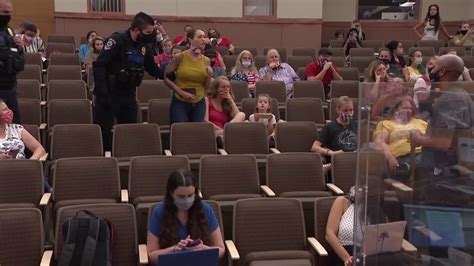
A New York judge has been censured for an outburst during a school board meeting where she vocally protested the decision to prevent her daughter from speaking as valedictorian at her graduation.
New York Judge Censured for Valedictorian Outburst at School Board
Judge Debra J. Young, a New York State Supreme Court Justice in the 8th Judicial District, has been formally censured by the New York State Commission on Judicial Conduct for her disruptive behavior during a Lancaster Central School District Board of Education meeting in June 2023. The censure stems from Young’s vocal and confrontational reaction to the board’s decision to prevent her daughter, identified as “Student A,” from delivering a valedictory address at her high school graduation.
According to the Commission’s determination, Young’s conduct “created the appearance that she was using the prestige of her judicial office to advance her daughter’s personal interests.” The Commission concluded that her actions were undignified, discourteous, and interfered with the performance of the School Board’s duties, violating the Rules Governing Judicial Conduct.
The incident unfolded during a public meeting where parents and students were addressing the board. Student A, who had maintained the highest grade point average in her graduating class, had initially been selected to give the valedictory speech. However, the school administration later informed her that she would not be allowed to speak due to concerns about the content of her planned address, which reportedly contained criticisms of the school administration.
Judge Young, attending the meeting as a concerned parent, expressed her outrage at the board’s decision. The Commission’s report details how she repeatedly interrupted the proceedings, raised her voice, and made accusatory statements toward board members and school officials. Witnesses at the meeting described her behavior as aggressive and intimidating.
The Commission’s formal written complaint detailed how Judge Young “repeatedly interrupted the meeting, spoke in a loud and angry tone, and accused the board members of treating her daughter unfairly.” It further stated that she directly challenged the board’s authority and created a disruptive environment that hindered the board’s ability to conduct its business.
The Commission’s investigation included reviewing video footage of the meeting, interviewing witnesses, and receiving written submissions from Judge Young. While Judge Young acknowledged that she had been emotional during the meeting, she maintained that she was acting solely as a parent advocating for her daughter and did not believe her actions violated judicial ethics.
In her defense, Judge Young argued that the school board’s decision was arbitrary and unjust, and that she had a right to speak out on behalf of her daughter. She contended that her passion and frustration were understandable given the circumstances and that she did not intend to undermine the authority of the board or create a hostile environment. She also stated that she did not explicitly identify herself as a judge during her initial comments but acknowledged that her identity was likely known by some attendees.
However, the Commission rejected Judge Young’s arguments, stating that her conduct was inappropriate for a judge, regardless of whether she explicitly identified herself as such. The Commission emphasized that judges are expected to maintain a high standard of decorum and impartiality, both on and off the bench, and that her behavior fell short of those standards.
The Commission’s determination cited specific rules from the Rules Governing Judicial Conduct, including those that require judges to conduct themselves in a manner that promotes public confidence in the integrity and impartiality of the judiciary, to be patient, dignified, and courteous in their official and personal conduct, and to avoid lending the prestige of their office to advance the private interests of others.
In issuing the censure, the Commission considered several factors, including the fact that Judge Young had no prior disciplinary record and that she expressed remorse for her actions. However, the Commission also noted the seriousness of the misconduct and the potential for it to undermine public trust in the judiciary.
The censure is a formal disciplinary action that is publicly recorded and may be considered in any future disciplinary proceedings. While it does not remove Judge Young from her position, it serves as a strong reprimand and a warning against future misconduct. The Commission’s decision underscores the importance of judges maintaining the highest ethical standards, even when acting in their personal capacities.
The case has sparked considerable debate within the legal community and the public, with some arguing that Judge Young was simply acting as a concerned parent and that the censure is an overreaction. Others argue that her behavior was clearly inappropriate for a judge and that the Commission’s action was necessary to uphold judicial ethics and maintain public confidence in the judiciary.
This incident also raises broader questions about the role of judges in their communities and the extent to which their personal lives are subject to scrutiny. While judges are expected to be active and engaged citizens, they must also be mindful of the potential for their actions to be perceived as influencing or undermining the integrity of the judicial system.
The New York State Commission on Judicial Conduct is an independent agency responsible for investigating complaints of misconduct against judges and justices in the New York State Unified Court System. The Commission has the authority to issue various disciplinary sanctions, ranging from confidential letters of caution to public censure, removal from office, and referral for criminal prosecution.
The Commission’s decision in the Judge Young case serves as a reminder to all judges of the importance of maintaining the highest ethical standards at all times and of avoiding any conduct that could compromise the integrity and impartiality of the judiciary. The case also highlights the challenges that judges face in balancing their personal lives with their professional responsibilities and the need to be constantly aware of the potential for their actions to be misconstrued or to create the appearance of impropriety.
The Lancaster Central School District has declined to comment on the matter, citing student privacy concerns. However, sources familiar with the situation have indicated that the school administration stood by its decision to prevent Student A from delivering the valedictory address, arguing that her planned speech contained inappropriate and potentially disruptive content.
The controversy surrounding the valedictorian speech has also raised questions about academic freedom and the rights of students to express their views, even if those views are critical of the school administration. While schools have a legitimate interest in maintaining order and decorum at graduation ceremonies, they must also respect the First Amendment rights of students to express themselves, within reasonable limits.
The Judge Young case is likely to continue to generate discussion and debate within the legal community and the public. It serves as a valuable case study in judicial ethics and the challenges that judges face in balancing their personal and professional lives. It also underscores the importance of maintaining public confidence in the integrity and impartiality of the judiciary.
The Commission’s decision emphasizes that judicial officers are held to a higher standard of conduct than private citizens, even when engaged in personal matters. Judge Young’s passionate advocacy for her daughter, while understandable, crossed the line into behavior that was deemed unbecoming of a judge.
This case serves as a precedent for future instances where judicial conduct outside of the courtroom comes into question. It reinforces the notion that a judge’s behavior, whether on or off the bench, can reflect on the judiciary as a whole and impact public perception. The Commission’s commitment to upholding ethical standards ensures that the integrity of the judicial system is protected.
Expanded Context and Background Information:
The role of a judge extends far beyond the confines of the courtroom. Judges are expected to embody the principles of justice, fairness, and impartiality in all aspects of their lives. This expectation stems from the critical role that judges play in upholding the rule of law and ensuring that all citizens are treated equally under the law. When a judge’s conduct falls short of these standards, it can undermine public confidence in the judiciary and erode the legitimacy of the legal system.
The New York State Commission on Judicial Conduct plays a vital role in maintaining the integrity of the judiciary by investigating allegations of misconduct and imposing disciplinary sanctions when warranted. The Commission’s work is essential to ensuring that judges are held accountable for their actions and that the public can have confidence in the fairness and impartiality of the courts.
The Rules Governing Judicial Conduct are designed to provide clear guidance to judges on the ethical standards that they are expected to uphold. These rules cover a wide range of conduct, including conflicts of interest, impartiality, decorum, and the use of judicial office for personal gain. The rules are intended to promote public confidence in the judiciary and to ensure that judges act with integrity and fairness at all times.
The Judge Young case highlights the challenges that judges face in balancing their personal lives with their professional responsibilities. Judges are often active and engaged members of their communities, and they may have strong opinions on a variety of issues. However, they must be careful to avoid engaging in conduct that could be perceived as influencing or undermining the integrity of the judicial system.
In this case, Judge Young was acting as a concerned parent advocating for her daughter. While her passion and frustration were understandable, her behavior at the school board meeting was deemed inappropriate for a judge. Her actions created the appearance that she was using the prestige of her judicial office to advance her daughter’s personal interests, which is a violation of the Rules Governing Judicial Conduct.
The Commission’s decision to censure Judge Young sends a clear message to all judges that they are expected to maintain the highest ethical standards at all times, even when acting in their personal capacities. The case also underscores the importance of judges being aware of the potential for their actions to be misconstrued or to create the appearance of impropriety.
The controversy surrounding the valedictorian speech also raises important questions about academic freedom and the rights of students to express their views. Schools have a legitimate interest in maintaining order and decorum at graduation ceremonies, but they must also respect the First Amendment rights of students to express themselves, within reasonable limits.
The decision to prevent Student A from delivering her valedictory address was undoubtedly a difficult one for the school administration. However, the way in which the decision was communicated and the subsequent events at the school board meeting could have been handled differently. A more collaborative approach, involving open communication and a willingness to listen to the concerns of all parties, might have avoided the escalation of the situation.
The Judge Young case serves as a valuable lesson for both judges and school administrators. It highlights the importance of maintaining ethical standards, respecting First Amendment rights, and engaging in open communication to resolve conflicts. By learning from this case, we can work to create a more just and equitable society for all.
The incident also raises questions about the pressures faced by high-achieving students and their families. The competition for academic success can be intense, and the stakes can feel very high. In this case, Student A had worked hard to achieve the highest grade point average in her class, and her family was understandably proud of her accomplishment. However, the school administration’s decision to prevent her from delivering her valedictory address was a major disappointment, and it is understandable that Judge Young reacted emotionally.
The Judge Young case is a complex and multifaceted one, with no easy answers. It raises important questions about judicial ethics, academic freedom, and the pressures faced by high-achieving students. By examining the case from all angles, we can gain a deeper understanding of the issues involved and work to create a more just and equitable society for all.
The situation also underscores the importance of clear and transparent policies regarding graduation speeches and student expression. Schools should have well-defined guidelines that outline the criteria for selecting valedictorians and the process for reviewing and approving speech content. These guidelines should be communicated clearly to students and their families to avoid misunderstandings and disputes.
Furthermore, schools should strive to create a supportive and inclusive environment where students feel comfortable expressing their views, even if those views are critical of the school administration. This can be achieved through open forums, student government organizations, and other channels of communication. By fostering a culture of dialogue and respect, schools can help to prevent conflicts from escalating and ensure that all students have a voice.
Quotes from the Original Source:
- The Commission’s formal written complaint detailed how Judge Young “repeatedly interrupted the meeting, spoke in a loud and angry tone, and accused the board members of treating her daughter unfairly.”
- The Commission’s determination, Young’s conduct “created the appearance that she was using the prestige of her judicial office to advance her daughter’s personal interests.”
Frequently Asked Questions (FAQ):
Q1: What exactly did Judge Young do that led to her censure?
A1: Judge Debra J. Young was censured for her disruptive behavior during a Lancaster Central School District Board of Education meeting in June 2023. She vocally protested the board’s decision to prevent her daughter from delivering a valedictory address at her high school graduation. Her actions included repeatedly interrupting the meeting, speaking in a loud and angry tone, and accusing board members of treating her daughter unfairly. The Commission found that this created the appearance she was using her judicial office’s prestige to advance her daughter’s personal interests.
Q2: What is the New York State Commission on Judicial Conduct, and what power does it have?
A2: The New York State Commission on Judicial Conduct is an independent agency responsible for investigating complaints of misconduct against judges and justices in the New York State Unified Court System. The Commission has the authority to issue various disciplinary sanctions, ranging from confidential letters of caution to public censure, removal from office, and referral for criminal prosecution. Its primary role is to ensure the integrity of the judiciary and maintain public confidence in the legal system.
Q3: What are the Rules Governing Judicial Conduct, and how did Judge Young violate them?
A3: The Rules Governing Judicial Conduct are a set of ethical standards that judges in New York State are expected to uphold. Judge Young was found to have violated rules requiring judges to conduct themselves in a manner that promotes public confidence in the integrity and impartiality of the judiciary, to be patient, dignified, and courteous in their official and personal conduct, and to avoid lending the prestige of their office to advance the private interests of others. Her outburst at the school board meeting was deemed to have violated these principles.
Q4: What was Judge Young’s defense against the charges of misconduct?
A4: In her defense, Judge Young argued that she was acting solely as a parent advocating for her daughter and did not believe her actions violated judicial ethics. She contended that the school board’s decision was arbitrary and unjust, and that she had a right to speak out on behalf of her daughter. She also stated that she did not explicitly identify herself as a judge during her initial comments but acknowledged that her identity was likely known by some attendees. However, the Commission rejected her arguments, stating that her conduct was inappropriate for a judge, regardless of whether she explicitly identified herself as such.
Q5: What is the significance of a censure, and what are the potential consequences for Judge Young?
A5: A censure is a formal disciplinary action that is publicly recorded and may be considered in any future disciplinary proceedings. While it does not remove Judge Young from her position, it serves as a strong reprimand and a warning against future misconduct. The Commission’s decision underscores the importance of judges maintaining the highest ethical standards, even when acting in their personal capacities. The censure could potentially impact her future career progression or judicial appointments.









